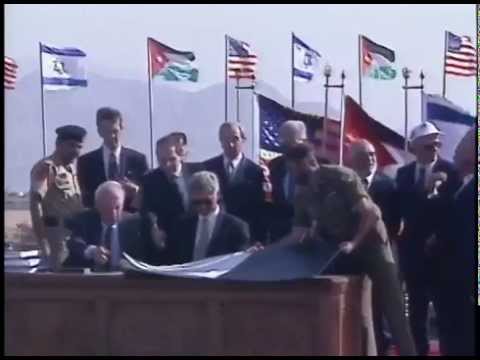Since the end of the 1967 war, there had been secret back-channel relations between Israel and Jordan, however, in early 1994, serious discussions over signing an accord began. Israeli Prime Minister Yitzchak Rabin and his Foreign Minister Shimon Peres, told King Hussein of Jordan that once the Oslo Accords were signed between Israel and the PLO, a peace agreement with Jordan might not happen. Hussein consulted with Egyptian President Mubarak and U.S. President Bill Clinton who encouraged him to start peace negotiations and sign an accord. Consequently, Rabin, Hussein, and Clinton signed the Washington Declaration on July 25, 1994, which stated that Israel and Jordan ended the official state of animosity and were actively beginning negotiations to create a lasting peace between the two nations.
The peace treaty was signed on October 26, 1994, in a ceremony held in the Arava valley of southern Israel, directly to the north of Eilat and near the southwestern Jordanian border. Clinton observed the signing along with his Secretary of State. The agreement was celebrated in both countries as well as in Egypt. The Lebanese terror group, Hezbollah, slammed the agreement, accusing Jordan of selling out to international pressure, and in an effort to thwart the ceremonies, they launched mortars and rockets into the northern Galilee region of Israel, about 150 kilometers north of where the ceremony was taking place. Northern Israeli residents were forced to evacuate the towns and find shelter where they used their emergency transistor radios to hear the historic moment. News outlets picked up on what was happening up north and hailed the effort of the northern residents in bomb shelters as a sign that the whole of Israel backed the agreement.
The treaty established peace between the two countries while also settling issues regarding territory, security, and water, providing cooperation in tourism and trade. Each country promised to respect the territory of each side. Following the agreements, both Israel and Jordan opened their borders allowing tourists, businessmen, and workers to travel between the two countries freely.
In 1995, Israeli Prime Minister Rabin was assassinated by an extremist who did not agree with the Israel-Palestine Oslo Accords. Hussein, King of Jordan, who grew close with Rabin during the treaty negotiations, was invited to give a speech at Rabin’s funeral in Jerusalem, and the King won the hearts of Israelis with his sincerity and obvious affection for Rabin. U.S. President Clinton ended his historical speech with the now infamous statement ‘Shalom Hever’ (‘farewell my friend’ in Hebrew).


